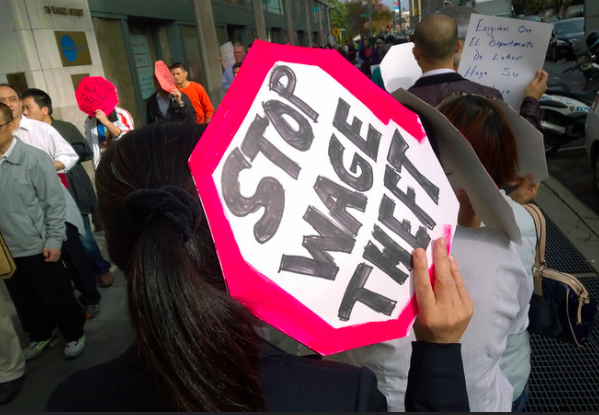Exploitation Of Undocumented Workers In Residential Construction Costs Massachusetts Taxpayers As Much As $82M Annually, UMass Study Finds

Photo: flckr.com
Source: UMass News and Media
A new business model in residential construction is exploiting undocumented workers and costing Massachusetts taxpayers as nearly $82 million annually, according to new research published today by the University of Massachusetts Amherst Labor Center.
Based on extensive interviews, Tom Juravich, Professor of Labor Studies and Sociology at UMass Amherst, and Russel Ormiston and Dale Belman of the Institute for Construction Economic Research found that in this new business model, practices — such as the illegal misclassification of workers as independent contractors, wage theft, tax fraud, and paying workers in cash — that were once at the margins of the construction industry are now at the center of medium and large residential construction in Massachusetts.
“In this new model, the majority of builders in residential construction have almost completely jettisoned regularized employees in residential construction,” Juravich says in the research report. “However, upon closer inspection, the vast majority of these workers, under current law in the Commonwealth, should be classified as employees.”
The researchers say that this reliance on illegally misclassified workers has been greatly facilitated by the emergence of a new labor intermediary: labor brokers, who supply the vast majority of mostly undocumented workers for jobs in residential construction. Without corporate identities, they operate largely in the shadows and are nearly untraceable in that they pay their workers in cash. This cash-only world is a hothouse for wage theft, a central feature of this business model.
“Workers in residential construction are pushed to work incredibly hard in precarious working conditions, and as cash workers, are not covered by workers’ compensation and have no access to the social and economic benefits normally obtained through employers,” Juravich says. “These practices are not restricted to the margins of residential construction. Major developers and general contractors who allow wage theft and tax fraud on their construction projects are fully aware of these illegal, unethical, and predatory practices in the construction process, yet they choose to utilize them anyway and profit greatly.”
Audits of employer payrolls from 2017 through 2019 provided by the Massachusetts Department of Unemployment Assistance indicate that more than one-in-six Massachusetts construction employers (16.8 – 17.9%) illegally misclassify workers as independent contractors. The authors project that misclassification in the Bay State construction industry led to a $24.5-$40.6 million shortfall in the state’s unemployment insurance fund in 2019.
Because of companies’ failure to withhold state payroll taxes, the researchers project that the Commonwealth lost between $6.7 and $41.3 million in personal income taxes in 2019.
Contractors also evaded between $37.0 and $78.3 million in workers’ compensation insurance premiums and shortchanged workers by not paying between $19.3 and $40.8 million in required overtime premiums in 2019.
“Our baseline estimates suggest that worker misclassification and off-the-books employment allowed Massachusetts construction employers to reduce labor costs by at least $140.4 million in 2019,” Ormiston says. “This likely undercounts the true social harm to workers and taxpayers.”
The authors suggest that the Commonwealth review and revise its current laws and invest significantly in monitoring and enforcement. Increased monitoring and enforcement will not only protect the most vulnerable workers toiling in the shadows, they say, but it will generate additional tax revenues beyond the costs of more vigorous monitoring and enforcement.
“In order to stem wage theft and the illegal misclassification of workers, developers, general and subcontractors must be held fully responsible for what happens on their job sites,” Juravich argues. “And finally, labor brokers must be regulated and the use of cash payments should be prohibited.”
The complete report, “The Social and Economic Costs of Illegal Misclassification, Wage Theft and Tax Fraud in Residential Construction in Massachusetts,” is published as part of the UMass Amherst Labor Center Working Paper Series, and is available online now.

Not to be glib or uncompassionate to victims of wage theft, who rightly are centered in this report, but one key takeaway I’m getting here is that the already-outrageous costs of new residential construction in this state should actually be even higher, were many builders not systematically exploiting undocumented workers by misclassifying them as independent contractors. We have a housing shortage and the problem is growing, and this is the “free-market” solution to that: hire undocumented workers and underpay them.
The practice, of general contractors or owners passing the buck, so to speak, has been going on in other industries and in other parts of the country for many many years. It’s the standard-operating-procedure for how larger institutions (like UMass in this case) use middle-men to ‘launder’ their liability for avoidance of employment laws and regulations and hire undocumented workers. How else to undocumented workers get hired at-scale? It’s pretty much the way it’s done. As a student at Georgetown University in the 1990s and 2000s, we documented how the institution did it by subcontracting the custodial services for half of campus to a contractor who, oh, just happened to employ entirely undocumented immigrants under abusive employment practices. Oh, not the university’s fault! Until there is some national legislation normalizing the labor status of currently undocumented workers, it’s a space where this abuse will certainly continue. Kudos to Tom for shining a light on it, but realistically, what is the commonwealth going to do about it (especially under Baker)?
One idea: add a provision to the Commonwealth’s umbrella “larceny” statute, Massachusetts General Laws, Chapter 266, Section 30, to include, as property that can be stolen, “money due and owing from an employer to an employee or independent contractor for services rendered” or something on those lines.
This would clearly criminalize wage theft. I’d include independent contractors to ensure protection for those who meet the legal criteria for being employees, but whom employers misclassify.